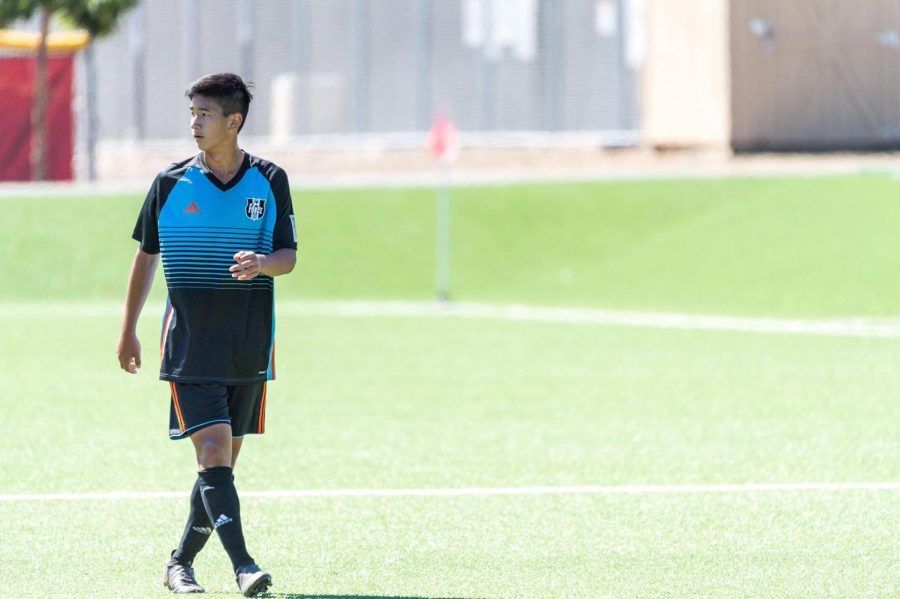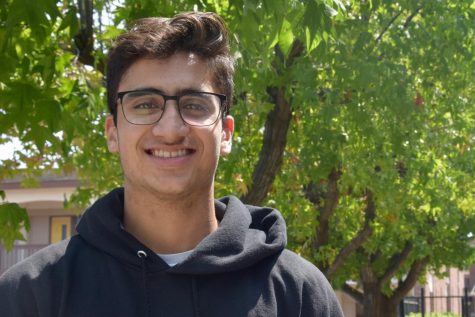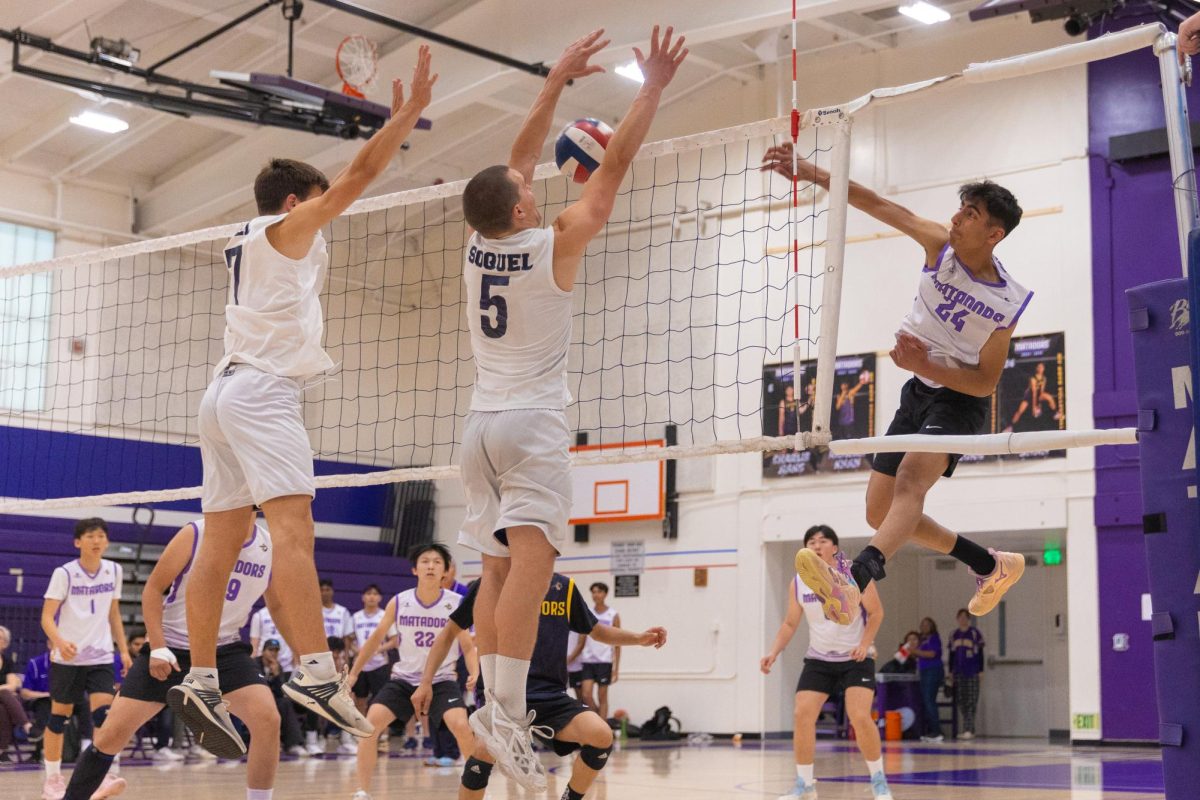Doubled up
Comparing school and club sports and the impact they have on academics
October 24, 2018
He looked around the field, scouting the other players. He was nervous but confident, knowing that he had a strong chance of making the team. All he was waiting for was his name to be called. Time went on, his coach pulling players off the field, congratulating them. But he didn’t hear his name.
As nervousness and doubt ran through his mind, he finally heard those two words. As he rushed to the coach, the worry left his body. Though it was a year-long commitment, and he wouldn’t be able to play for his school team, he had made one of the top soccer teams in northern California.
Junior Brett Park plays competitive soccer for De Anza Force Academy U-17. Because of the high level of commitment required to play, athletes are required to sign a contract with the U.S. Soccer Development Academy (USSDA) that restricts them from playing for school. Due to the number of hours Park puts into his Academy team, he experiences difficulty balancing academics and club.
“I definitely use those three tutorials [and] sometimes I go in at lunch, but I definitely manage my time with planners,” Park said.
In addition to games and tournaments that span yearlong, Park participates in matches all over the world that he says negatively affect his academics.
“I’d say at least eight trips whether [that be] in state or out of state or in SoCal and then we had a trip to Spain,” Park said. “That ruined all my grades, it fell about five percent [in] each class.”
Park believes that though he made the decision to play for his club team, he misses out on the unique atmosphere that playing on a school team provides. Park admits that if there was no such contract between him and the USSDA, he would take the opportunity to play both.
“I see groups of people — football teams — and they have a real [brotherhood],” Park said. “I think it would be really fun, because I see all my friends play on the soccer team, but then I [remember that I] can’t.”
Although Park would like to be a part of a school team, he still recognizes the benefits of playing for the Academy, specifically the competitive environment that it offers him. Park hopes to continue his soccer career in college, and believes that playing for the school team would not give him the same kind of opportunities.
“I get a lot better because the Academy program is more competitive than at MVHS,” Park said. “I would rather get the college exposure from being a full-time academy player.”
Junior dancer Jana Tsai has also been exposed to a high level of competition that has taken a toll on her academics. She is a part of the MVHS dance team and a competitive team at NorCal Dance Arts, which takes her to competitions around the state and country.
Tsai explained the struggle of managing her time due to the workload of dancing for two teams. To make sure that she doesn’t fall behind in school, Tsai finds it necessary to communicate with her club and school coaches to ensure that her schedules will not overlap and create problems.
“I had to work out the conflicts that I’m going to have for the upcoming season because there [are] a lot of competitions during second semester that clash with the rehearsals that I have otherwise,” Tsai said.
Head coach of the MVHS boys varsity soccer team, Todd Kimble, explains how student athletes are not as committed to school sports as they are to club sports. He mentions that students do not put the time and effort required into school sports due to the academic environment at MVHS.
“The parents are paying [for their children to be in club teams], and you’re committed and the coaches wrap you into a commitment,” Kimble said. “Whereas in the high school sports, it’s much harder to wrap you into the commitment. Club comes first when it comes to soccer, however, grades come first even over that.”
Kimble explains that students have a different mentality when it comes to club sports and they become more focused and more determined, mainly because parents are playing for their children to play.
“It’s a way [they] approach it, ‘my parents are paying for it, my coach is demanding certain things’ and you are not with your buddies,” Kimble said. “There’s the mentality [that] ‘I’m going to go there to work.’ In high school, that’s where I think the difference is.”
Both Tsai and Park explain how much more competitive club sports are in comparison to school teams.
“I think the [MVHS team] is more focused on being a team and bonding, and it’s in school, so I feel like it’s not as intense or scary,” Tsai said. “When I’m with an outside dance group, my teachers are more focused on improving individuals [and] preparing them for potential careers as dancers.”
While Tsai acknowledges the intense environment that her academy brings, she still enjoys the team bonding activities with her school dance group during the season. With as much pressure and anxiety that comes with competing for a club, Tsai says this is something that the school can offer that her academy cannot.
“[The MVHS dance team] actually did specific activities, and I really liked it because I got to know the people I’d be dancing with at the at the camp that we went to over summer,” Tsai said.
In January of 2018, Tsai was also presented the opportunity to compete on NBC’s “World of Dance” with her academy dance team. On the show, competitive dance teams across the nation showcase their talents for a panel of judges. Tsai shared that she dedicated a lot of time to the show, including extra practices and rehearsals which took more time away from her school work.
“I think that the rehearsals leading up to going to the show were pretty stressful becauseour teacher she really wanted us to do well,” Tsai said.
Similar to Tsai’s experience on “World of Dance,” in March of 2017, Park went to Barcelona to play in the prestigious Mediterranean International Cup, where they faced teams ranging from Spain, Japan and Australia. His team won three games, tied one and lost the other in a penalty shootout, finishing 32 in the international tournament.
Regardless of the commitment an outside sports team requires, Park and Tsai still feel like the benefits outweigh the sacrifices that they continue to make to compete at the highest levels. For Park, playing in the Academy gives him a unique chance to pursue a collegiate career.
“I’m playing soccer right now a lot because it’s not only fun,” Park said. “It definitely gives me like a more of an opportunity to get into like colleges rather than just like my education alone.”



















